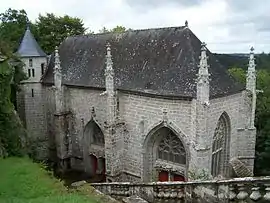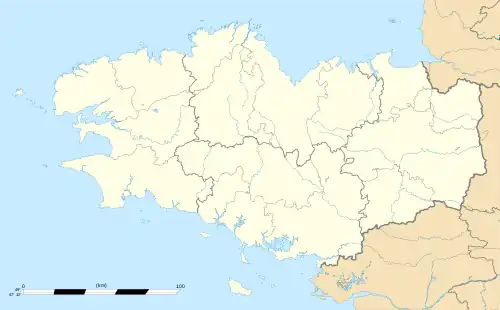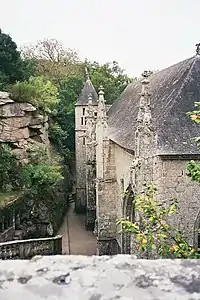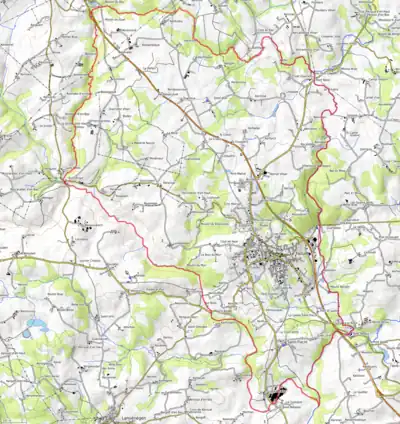Le Faouët, Morbihan
Le Faouët ([lə fawɛt]; Breton: Ar Faoued) is a commune in the Morbihan department of the region of Brittany in north-western France.
Le Faouët
Ar Faoued | |
|---|---|
 Chapel of Saint Barbara | |
.svg.png.webp) Coat of arms | |
Location of Le Faouët | |
 Le Faouët  Le Faouët | |
| Coordinates: 48°02′02″N 3°29′25″W | |
| Country | France |
| Region | Brittany |
| Department | Morbihan |
| Arrondissement | Pontivy |
| Canton | Gourin |
| Intercommunality | Roi Morvan Communauté |
| Government | |
| • Mayor (2020–2026) | Christian Faivret[1] |
| Area 1 | 34.03 km2 (13.14 sq mi) |
| Population | 2,800 |
| • Density | 82/km2 (210/sq mi) |
| Time zone | UTC+01:00 (CET) |
| • Summer (DST) | UTC+02:00 (CEST) |
| INSEE/Postal code | 56057 /56320 |
| Elevation | 53–202 m (174–663 ft) (avg. 152 m or 499 ft) |
| 1 French Land Register data, which excludes lakes, ponds, glaciers > 1 km2 (0.386 sq mi or 247 acres) and river estuaries. | |
The 16th-century timber market hall is a noted feature of the town, and two medieval chapels lie within the boundaries of the commune.
Toponymy
Faoued (French: Faouët) is a Breton word meaning "beech forest".
Geography
Le Faouët/Ar Faoued is 19 km (12 mi) north of Quimperlé, 33 km (21 mi) northwest of Lorient and 47 km (29 mi) east of Quimper. It lies in the historical region of Cornouaille. Traditionally a Breton-speaking area, the French language became commonly used from the 1950s. The town lies in the valley of the river Ellé. The river Ellé forms the commune's eastern border. The river Inam forms the commune's western border and flows into the river Ellé. Apart from the town, there are about one hundred and twenty hamlets and isolated farms. In the center of the town stands the 16th-century timber market halls.
Map
List of places
|
|
|
|
History
The oldest surviving parish registers date back to 1544. An infamous historical resident of Le Faouët is Marion du Faouët, the head of an 18th-century group of bandits who became a local bogeyman after her death.
Administration
Until 2015, Le Faouët/Ar Faoued was the seat of the canton of Le Faouët, which consisted of 6 communes.[3] Since the 2015 canton reorganisation, it is part of the canton of Gourin.[4]
Demographics
Inhabitants of Le Faouët are called Faouëtais.
| Year | Pop. | ±% p.a. |
|---|---|---|
| 1968 | 3,048 | — |
| 1975 | 3,149 | +0.47% |
| 1982 | 3,177 | +0.13% |
| 1990 | 2,869 | −1.27% |
| 1999 | 2,806 | −0.25% |
| 2007 | 2,901 | +0.42% |
| 2012 | 2,821 | −0.56% |
| 2017 | 2,803 | −0.13% |
| Source: INSEE[5] | ||
Breton language
In 2008, 14,24% of the children attended the bilingual schools in primary education.[6]
Tourist attractions

The 16th-century halles, or covered market, remain in use and are a rare surviving example of a large timber structure from the period.
The chapel of Saint Barbara is sited on a hilltop overlooking the Ellé. The 15th-century chapel of Saint Fiacre was recently restored. The polychrome timber interior was highly regarded, and earned its creator, Olivier Le Loergan, a title of nobility. The stained glass is also noteworthy. Parts of the interior have suffered considerable damage from insects.
.jpg.webp)
See also
References
- "Maires du Morbihan" (PDF). Préfecture du Morbihan. 7 July 2020.
- "Populations légales 2020". The National Institute of Statistics and Economic Studies. 29 December 2022.
- Populations légales 2012: 56 Morbihan, INSEE
- "Décret n° 2014-215 du 21 février 2014 portant délimitation des cantons dans le département du Morbihan | Legifrance". Retrieved 18 May 2021.
- Population en historique depuis 1968, INSEE
- (in French) Ofis ar Brezhoneg: Enseignement bilingue
External links
- Base Mérimée: Search for heritage in the commune, Ministère français de la Culture. (in French)
